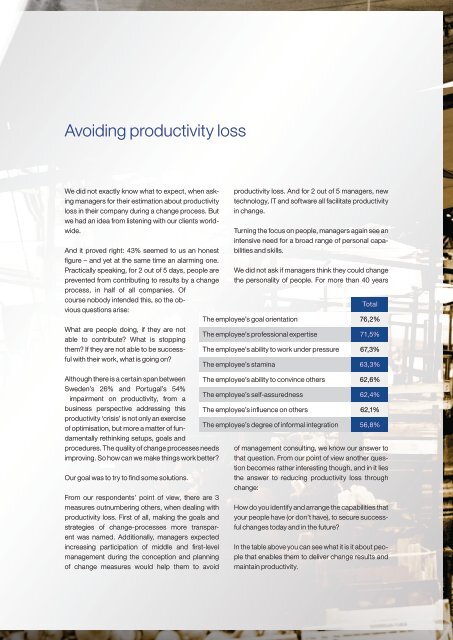MU Insight Survey 2012 Change and Productivity
MU Insight Survey 2012 Change and Productivity
MU Insight Survey 2012 Change and Productivity
Create successful ePaper yourself
Turn your PDF publications into a flip-book with our unique Google optimized e-Paper software.
Avoiding productivity loss<br />
We did not exactly know what to expect, when asking<br />
managers for their estimation about productivity<br />
loss in their company during a change process. But<br />
we had an idea from listening with our clients worldwide.<br />
And it proved right: 43% seemed to us an honest<br />
figure – <strong>and</strong> yet at the same time an alarming one.<br />
Practically speaking, for 2 out of 5 days, people are<br />
prevented from contributing to results by a change<br />
process, in half of all companies. Of<br />
course nobody intended this, so the obvious<br />
questions arise:<br />
What are people doing, if they are not<br />
able to contribute? What is stopping<br />
them? If they are not able to be successful<br />
with their work, what is going on?<br />
Although there is a certain span between<br />
Sweden’s 26% <strong>and</strong> Portugal’s 54%<br />
impairment on productivity, from a<br />
business perspective addressing this<br />
productivity ‘crisis’ is not only an exercise<br />
of optimisation, but more a matter of fundamentally<br />
rethinking setups, goals <strong>and</strong><br />
procedures. The quality of change processes needs<br />
improving. So how can we make things work better?<br />
Our goal was to try to find some solutions.<br />
From our respondents’ point of view, there are 3<br />
measures outnumbering others, when dealing with<br />
productivity loss. First of all, making the goals <strong>and</strong><br />
strategies of change-processes more transparent<br />
was named. Additionally, managers expected<br />
increasing participation of middle <strong>and</strong> first-level<br />
management during the conception <strong>and</strong> planning<br />
of change measures would help them to avoid<br />
productivity loss. And for 2 out of 5 managers, new<br />
technology, IT <strong>and</strong> software all facilitate productivity<br />
in change.<br />
Turning the focus on people, managers again see an<br />
intensive need for a broad range of personal capabilities<br />
<strong>and</strong> skills.<br />
We did not ask if managers think they could change<br />
the personality of people. For more than 40 years<br />
Total<br />
The employee’s goal orientation 76,2%<br />
The employee’s professional expertise 71,5%<br />
The employee’s ability to work under pressure 67,3%<br />
The employee’s stamina 63,3%<br />
The employee’s ability to convince others 62,6%<br />
The employee’s self-assuredness 62,4%<br />
The employee’s influence on others 62,1%<br />
The employee’s degree of informal integration 56,8%<br />
of management consulting, we know our answer to<br />
that question. From our point of view another question<br />
becomes rather interesting though, <strong>and</strong> in it lies<br />
the answer to reducing productivity loss through<br />
change:<br />
How do you identify <strong>and</strong> arrange the capabilities that<br />
your people have (or don’t have), to secure successful<br />
changes today <strong>and</strong> in the future?<br />
In the table above you can see what it is it about people<br />
that enables them to deliver change results <strong>and</strong><br />
maintain productivity.


